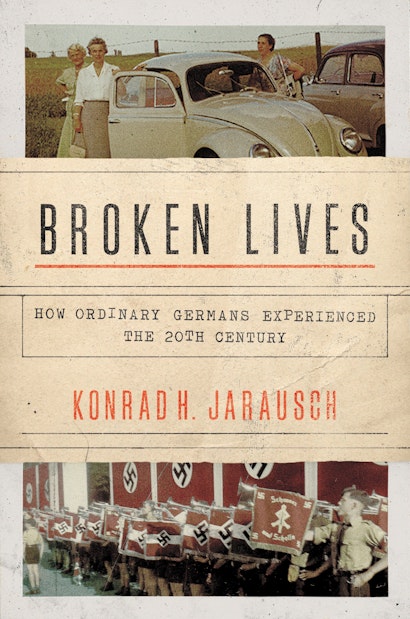Additional Reading
The historian will tell you what happened. The novelist will tell you what it felt like. E.L. Doctorow
The following are brief reviews on some of the author’s favorite books on Germany during and between the two World Wars.
A Village in the Third Reich: How Ordinary Lives Were Transformed by the Rise of Fascism – Julia Boyd – An intimate portrait of German life during World War II, shining a light on ordinary people living in a picturesque Bavarian village under Nazi rule, from a past winner of the Los Angeles Times Book Prize for History... Drawing on personal archives, letters, interviews and memoirs, it lays bare their brutality and love; courage and weakness; action, apathy and grief; hope, pain, joy, and despair. (Amazon)
Ordinary Men: Reserve Police Battalion 101 and the Final Solution in Poland – Christopher R. Browning – “A remarkable—and singularly chilling—glimpse of human behavior. . .This meticulously researched book…represents a major contribution to the literature of the Holocaust.” (Newsweek)
“The true story of Reserve Police Battalion 101 of the German Order Police, which was responsible for mass shootings as well as round-ups of Jewish people for deportation to Nazi death camps in Poland in 1942. … a powerful, chilling, and important work with themes and arguments that continue to resonate today.” (Harper-Collins)
The Man in the High Castle – Philip K. Dick – “In this Hugo Award–winning alternative history classic—the basis for the Amazon Original series—the United States lost World War II and was subsequently divided between the Germans in the East and the Japanese in the West… The Man in the High Castle is Dick at his best, giving readers a harrowing vision of the world that almost was.” (Barnes & Noble)
“The single most resonant and carefully imagined book of Dick’s career.” (New York Times)
All the Light We Cannot See – Anthony Doerr – “A beautiful, stunningly ambitious novel about a blind French girl and a German boy whose paths collide in occupied France as both try to survive the devastation of World War II… In this magnificent, deeply moving novel, the stories of Marie-Laure and Werner illuminate the ways, against all odds, people try to be good to one another. (The Nile)
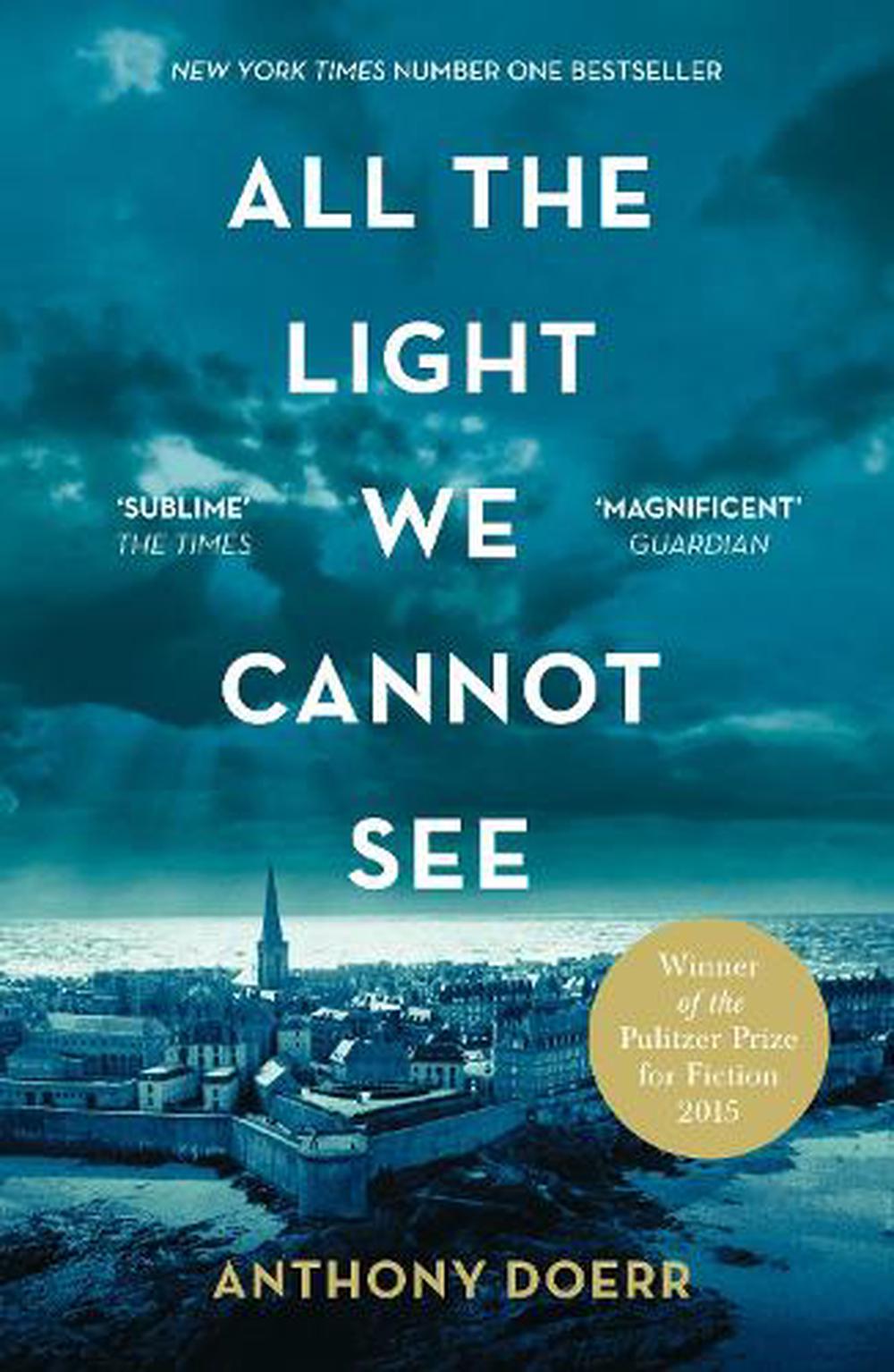
The Coming of the Third Reich – Richard J. Evans – Unfolds perhaps the single most important story of the 20th century: how a stable and modern country in less than a single lifetime led Europe into moral, physical and cultural ruin and despair… With authority, skill and compassion, Evans recreates a country torn apart by overwhelming economic, political and social blows: the First World War, Versailles, hyperinflation and the Great Depression. One by one these blows ruined or pushed aside almost everything admirable about Germany, leaving the way clear for a truly horrifying ideology to take command.” (Penguin)
Every Man Dies Alone – Hans Fallada – “Inspired by a true story … the gripping tale of an ordinary man’s determination to defy the tyranny of Nazi rule. Berlin, 1940, and the city is filled with fear. At the house on 55 Jablonski Strasse, its various occupants try to live under Nazi rule in their different ways.” (Goodreads)
‘To read Fallada’s testament to the darkest years of the 20th century is to be accompanied by a wise, somber ghost who grips your shoulder and whispers into your ear: “This is how it was. This is what happened”‘. (The New York Times)
Fall of Giants – Ken Follett – “the first part of the Century Trilogy which follows five interrelated families throughout the course of the 20th century. The first book covers notable events such as World War I, the Russian Revolution, and the struggle for women’s suffrage. The sequel Winter of the World covers World War II and … the third book, Edge of Eternity, covers the Cold War” (Wikipedia)
The Diary of a Young Girl – Anne Frank– “Journal by … a Jewish teenager who chronicled her family’s two years (1942–44) in hiding during the German occupation of the Netherlands during World War II. The book was first published in 1947—two years after Anne’s death in a concentration camp – and later became a classic of war literature.”

Hitler’s Willing Executioners: Ordinary Germans and the Holocaust – Daniel Jonah Goldhagen – “Hitler’s Willing Executioner’s is an original, indeed brilliant contribution to the…literature on the Holocaust.” (New York Review of Books)
“A challenging, powerfully argued, and morally passionate account of the extermination of the Jews by Nazi Germany. Goldhagen has done prodigious research in order to find out who the ‘willing executioners’ were and what they did.” (Foreign Affairs)
“The most important book ever published about the Holocaust…Eloquently written, meticulously documented, impassioned…A model of moral and scholarly integrity.” (Philadelphia Inquirer)

The Nightingale – Kristin Hannah – “this unforgettable novel of love and strength in the face of war … captures the epic panorama of World War II and illuminates an intimate part of history seldom seen: the women’s war—a heartbreakingly beautiful novel that celebrates the resilience of the human spirit and the durability of women. It is a novel for everyone, a novel for a lifetime. (Macmillan Publishers)

The Death of Democracy: Hitler’s Rise to Power and the Downfall of the Weimar Republic – Benjamin Carter Hett – “How a hypernationalist, crafty liar exploited political divisions in 1930s Germany.” (Goodreads.com)
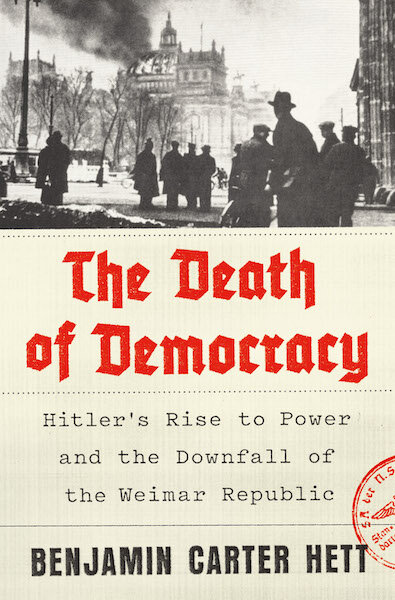
On Hitler’s Mountain: Overcoming the Legacy of a Nazi Childhood – Irmgard A. Hunt – “The young Irmgard Paul, out walking with her mother in their home town of Berchtesgaden in the late 1930s, remembers being told that, thanks to the large groups of SS men guarding Germany’s messianic leader in his mountainside retreat above them, they lived ‘on a mountain free of crime’. This small but horribly ironic story is just one of many poignant recollections which make it worth reading this candid memoir of a childhood spent, literally, in Hitler’s shadow.” (Literary Review)

Schindler’s List – Thomas Kennealy – “A remarkable work of fiction based on the true story of German industrialist and war profiteer, Oskar Schindler, who, confronted with the horror of the extermination camps, gambled his life and fortune to rescue 1,300 Jews from the gas chambers. Working with the actual testimony of Schindler’s Jews, Thomas Keneally artfully depicts the courage and shrewdness of an unlikely savior, a man who is a flawed mixture of hedonism and decency and who, in the presence of unutterable evil, transcends the limits of his own humanity. (Google Books)
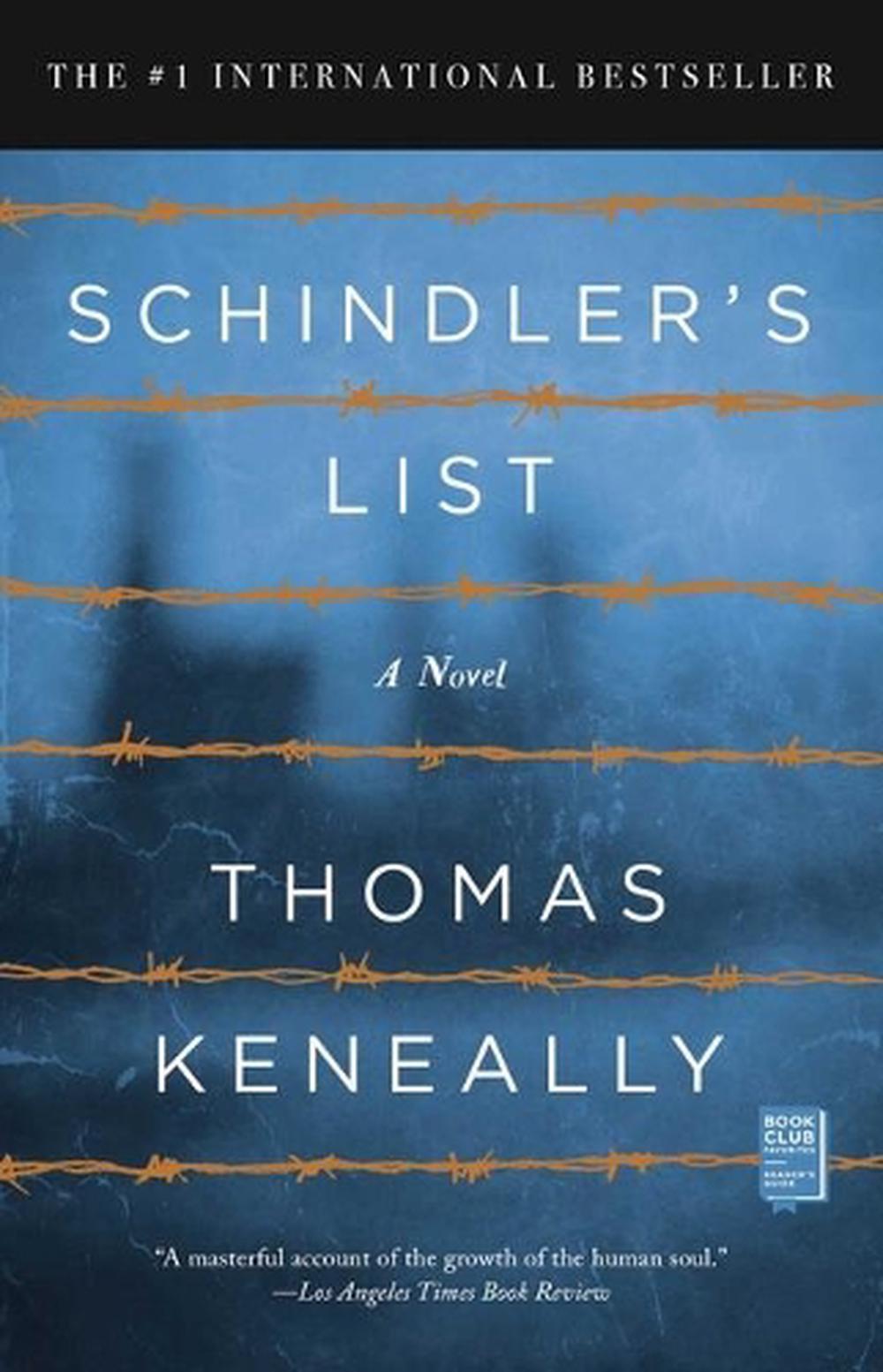
In the Garden of Beasts – Erik Larson – “A disturbing but highly compelling account of the life of the American ambassador to Germany and his family during Hitler’s rise to power… Focuses on a narrow yet intriguing chapter of the buildup to the war: what life was like in Berlin among the social and political elite as Hitler became chancellor, told through the eyes of a most unusual ambassador and his family. (The Christian Science Monitor)
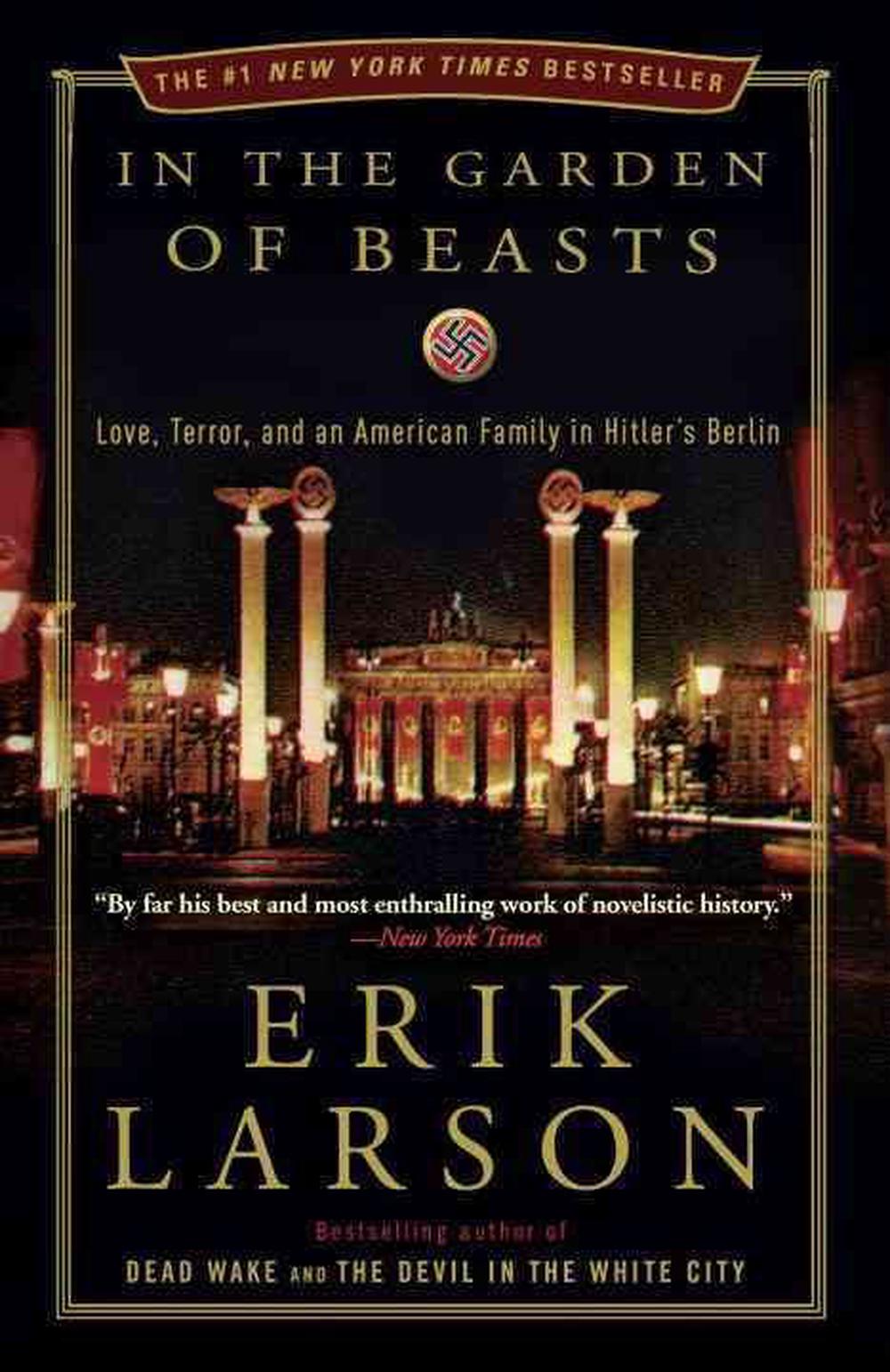
It Can’t Happen Here – Sinclair Lewis – 1935 dystopian political novel… Set in a fictionalized version of the 1930’s United States, it follows an American politician, Berzelius “Buzz” Windrip, who quickly rises to power to become the country’s first outright dictator (in allusion to Adolf Hitler’s rise to power in Nazi Germany), and Doremus Jessup, a newspaper editor who sees Windrip’s fascist policies for what they are ahead of time and who becomes Windrip’s most ardent critic.

How Could This Happen – Dan McMillan– “Masterfully synthesizing the myriad causes that led Germany to disaster, McMillan shows why thousands of Germans carried out the genocide while millions watched, with cold indifference, as it enveloped their homeland. Persuasive and compelling, How Could This Happen explains how a perfect storm of bleak circumstances, malevolent ideas, and damaged personalities unleashed history’s most terrifying atrocity.” (Amazon)

The Tattooist of Auschwitz – Heather Morris – “Yes, this book is about the horrors of the Holocaust, but more than this, it’s a book about love and the limits of human endurance. There is violence and loss, but at the same time, the reader is also a witness to bravery and determination.” (Princeton Book Review)

A Mother’s War – Helen Parusel – A forbidden romance in occupied Norway … Narvik, 1940. After Laila awakens to the sight of warships in the fjord, it isn’t long before she turns resistor to the brutal Nazi regime. She is horrified when local girls begin affairs with enemy soldiers, yet against her own principles, she finds herself falling in love with German soldier… But then Laila finds out she is pregnant… she turns to a home for women which promises to care for her and her unborn child. But instead, she finds herself caught in a system of evil far beyond what she thought possible… (Amazon)

All Quiet on the Western Front – Erich Maria Remarque – “the most famous anti-war novel ever written, now a major Netflix film adaptation. … the moving story of a young ‘unknown soldier’ experiencing the horror and disillusionment of life in the trenches [of World War I]. (Penguin Books)
The White Rose: Munich 1942 – 1943 – Inge Scholl – “Tells the story of Hans Scholl and Sophie Scholl, who in 1942 led a small underground organization of German students and professors to oppose the atrocities committed by Hitler and the Nazi Party. They named their group the White Rose, and they distributed leaflets denouncing the Nazi regime. Sophie, Hans, and a third student were caught and executed. Written by Inge Scholl (Han’s and Sophie’s sister), The White Rose features letters, diary excerpts, photographs of Hans and Sophie, transcriptions of the leaflets, and accounts of the trial and execution. This is a gripping account of courage and morality. (Wesleyan University Press)
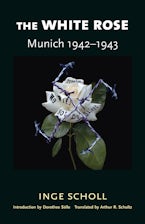
The Rise and Fall of the Third Reich – William Shirer – “Here is the complete story of Hitler’s empire, one of the most important stories ever told, written by one of the men best equipped to write it. This worldwide bestseller has been acclaimed as the definitive book on Nazi Germany; it is a classic work.” (Amazon)
Maus: A Survivor’s Tale – Art Spiegelman – “The most affecting and successful narrative ever done about the Holocaust” (Wall Street Journal)
“The first masterpiece in comic book history” (The New Yorker)
Pulitzer Prize Winner and one of Variety’s “Banned and Challenged Books Everyone Should Read”.
A brutally moving work of art—widely hailed as the greatest graphic novel ever written—Maus recounts the chilling experiences of the author’s father during the Holocaust, with Jews drawn as wide-eyed mice and Nazis as menacing cats. (Amazon)

Hitler: The Fuhrer and the People – J. P. Stern – “Professor Stern seeks to expose the roots of the Hitler myth… The questions [he] asks are fundamental and still of the first importance in our own society. How could a predominantly sober, hardworking, and well-educated nation be persuaded to follow Hitler and his inhuman and destructuve program?” (Amazon)

Sofie’s Choice – William Styron – “examines the historical, moral, and psychological ramifications of the Holocaust through the tragic life of a Roman Catholic survivor of Auschwitz. An award-winning film adaptation starring Meryl Streep was released in 1982.” (Britannica)
“Seems to be a strong but skin-deep psychosexual melodrama that’s been artificially heaped with import by making one of the characters—Sophie—a concentration-camp survivor… Still, with all that said, Styron is a born writer … there’s enough detailed, vigorous, sheer readability here to sustain even some of those readers bound to be turned off by the sticky contrivances and hollow pretentions.” (Kirkus Reviews)
The Story of the Trapp Family Singers – Maria Augusta Trapp – “With nearly 1,500 Broadway performances, six Tony Awards, more than three million albums sold, and five Academy Awards, The Sound of Music, based on the lives of Maria, the baron, and their singing children, is as familiar to most of us as our own family history. But much about the real-life woman and her family was left untold. Here, Baroness Maria Augusta Trapp tells in her own beautiful, simple words the extraordinary story of her romance with the baron, their escape from Nazi-occupied Austria, and their life in America.” (Amazon)

Slaughterhouse Five – Kurt Vonnegut – “A desperate, painfully honest attempt to confront the monstrous crimes of the twentieth century/” (Time)
“One of the world’s great antiwar books. Centering on the infamous World War II firebombing of Dresden … it combines historical fiction, science fiction, autobiography, and satire in an account of the life of Billy Pilgrim, a barber’s son turned draftee turned optometrist turned alien abductee. As Vonnegut had, Billy experiences the destruction of Dresden as a POW. Unlike Vonnegut, he experiences time travel, or coming “unstuck in time.” (Amazon)

Night – Elie Wiesel – “Night is Elie Wiesel’s masterpiece, a candid, horrific, and deeply poignant autobiographical account of his survival as a teenager in the Nazi death camps.” (Macmillan)
One of the most horrifying memoirs ever written … In stark, simple language, [the author] describes what happened to him and to his family. It is hard to imagine anything more hellish… Throughout, Wiesel conveys a collective sense of disbelief that “disciplined, educated men” could commit such crimes. (Phil Mongredien, The Guardian)

The Book Thief – Markus Zusak – “A profoundly emotional modern classic about courage, rebellion and the enduring power of books, Zusak’s sweeping novel centres on a nine-year-old girl in Nazi Germany and her daring reclamation of forbidden literature.” (Waterstones)
“Unsettling, life-affirming, triumphant and tragic. This is a novel of breathtaking scope, masterfully told” (The Guardian)


